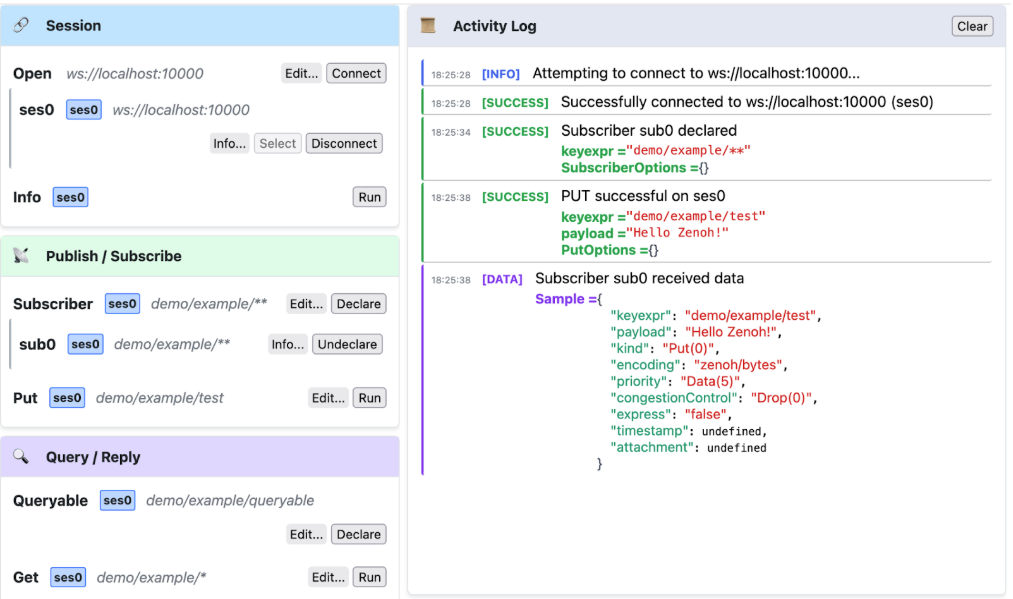Zenoh 1.5.0: Hong, the Red Dragon's Power
28th July, 2025 -- Paris.
Named after the Red Dragon, a symbol of power, protection, and passion, this release delivers significant improvements across the entire Zenoh ecosystem. Hong brings substantial performance enhancements—we’ve broken the 10M msg/sec barrier—and our shared memory implementation has 25% performance throughput gains along with a simplified API and improved safety mechanisms. Configuration management has been streamlined with better validation and the ability to provide full configurations via command line. The installation process has been modernized with signed Debian repositories for enhanced security.
This release also includes major updates to language bindings: Zenoh-TS now features binary serialization for improved performance and a camelCase API, Zenoh-Pico adds STM32 ThreadX support and peer-to-peer multicast improvements, and Advanced Pub/Sub functionality has been expanded across multiple bindings.
Let’s dive into the highlights of this release.
Zenoh
Throughput
This release of Zenoh has further improved its performance by breaking the 10M msg/sec barrier, as measured on our MacBook laptops. We have almost doubled the throughput for small messages (8 bytes) since the release of 1.0.0.
If you want to check out the performance on your hardware, just do:
$ cargo run --release --example z_sub_thr -- --no-multicast-scouting -l tcp/127.0.0.1:7447 -s 30
$ cargo run --release --example z_pub_thr -- --no-multicast-scouting -e tcp/127.0.0.1:7447 8
10648918.469217971 msg/s
10751147.174281364 msg/s
10658802.460094243 msg/s
10605109.520556785 msg/s
10769720.542983461 msg/s
10690899.371909663 msg/s
10758472.296933835 msg/s
SHM: Performance, Safety and Simplicity
In this release, Zenoh’s shared memory has become more performant, safer, and easier to use—both for newcomers and power users alike. Here are the important changes:
SHM API Simplification & Examples
Hidden ProtocolID: The low-level
ProtocolIDis now internal to the SHM API, slimming down public types and reducing noise for most users.Streamlined Builders:
ShmProviderBuilderAPIs have been overhauled for consistency and ease of use—defaults are smarter and method chains are shorter.Improved Examples: A brand-new minimal SHM example has been added, and existing examples have been refactored to use the simplified API patterns.
More details can be found in this PR.
Watchdog Storage & Performance Tuning
≈25% Throughput Gain: Internal SHM watchdog confirmator storage was re-architected—metadata cells now grow on demand and Arc-based ownership was tightened—yielding an extra ~600 K msgs/sec (from 2.4 M to ~3 M msgs/sec).
Arena Utilization Fix: The metadata segment now properly expands when cell exhaustion occurs, preventing stalls when the arena still has free memory but no metadata slots.
Lifetime Safety: Shared memory buffers now own their underlying segment handle to guarantee correct cleanup.
More details can be found in this PR.
SHM Buffer Layout & Alignment
Relayout & Resize Operations: Buffers can now be resized in place, improving flexibility for dynamic data workloads.
Owned vs. Borrowed Buffers: The relationship between owned and borrowed SHM buffers was clarified, fixing several edge-case bugs in buffer/session tests.
Alignment Constants: Alignment parameters are exposed via new constants (default = 1)
More details can be found in this PR.
Consistent Re-exports & API Sync
Pruned Client Storage: ProtocolID usage has been fully removed from the Rust client-storage module to match the new hidden-ID approach.
Docs & Safety Notes: The safety-critical portions of the SHM API documentation have been reformatted for clarity.
More details can be found in this PR.
SHM Polish & Ergonomic Tweaks
Infallible POSIX Builder:
with_size()on the POSIXShmProviderBuilderis now guaranteed to succeed, removing the need for error handling in most cases.Unchecked Mutability Helpers: New
as_mut_unchecked()methods across all SHM buffer types simplify scenarios where unchecked raw access is safe. Please check the ZSHM repo to see the examples of unchecked mutability power usage.Alignment Builders: Added
for_type()andfor_val()constructors for alignment helpers, plus a new default alignment setter on the SHM provider builder.Cross-Platform Fixes: Windows support has been hardened, and a round of
rustfmt/clippyadjustments keep the codebase idiomatic.More details can be found in this PR.
Following the Zenoh SHM API changes, full support for the API and example updates have been implemented for both Zenoh-C and Zenoh-Cpp. You can find the relevant updates in the following pull requests:
Configuration improvements
Improved configuration validation
The following parts of the configuration are now properly validated at load time:
access_controldownsamplinglow_pass_filterqos/network
Providing a full configuration through –cfg command line argument
It is now possible to provide a full configuration through the command line with the --cfg argument.
Example:
zenohd --cfg=':{id:"aa",listen:{timeout_ms:10}}'
Optional ID in the configuration
The id field of the configuration was a non-optional field that was automatically set up at configuration creation or at configuration load if not explicitly provided. Because of this, it was impossible to clone and reuse a configuration as-is because this would result in two configurations with the same id.
This field has been made optional and the id is automatically generated at configuration application (not at configuration creation/load) if not explicitly provided.
For example, the following code now works properly:
import time
import zenoh
conf = zenoh.Config()
session1 = zenoh.open(conf)
session1.declare_subscriber("key/expression", lambda sample:
print(f"Received {sample.payload.to_string()}"))
session2 = zenoh.open(conf)
session2.put("key/expression", "value")
DSCP link configuration support
Endpoints now support DSCP configuration, which can be specified in the endpoint string as follows: "tcp/192.168.0.1:7447#dscp=0x08"
This means you can now control the type of service that your routers and switches will apply to Zenoh traffic, making it possible for them to differentiate real-time traffic.
Link weight support
We have added support for weighted routing graphs. In other words, you can now assign weights to any of the links in the communication graph to express routing cost. At any given point in time, the routing algorithm will choose the path with minimal cost to route data from A to B.
Example:
zenohd --cfg='routing:router:linkstate:transport_weights:[{"dst_zid": "zid1", "weight": 10}, {"dst_zid": "zid2", "weight": 42}]'
Breaking change: Reply::replier_id
The unstable replier_id API, which used to return a ZenohId, is now aligned with other SourceInfo implementations, returning an EntityGlobalId which allows it to globally identify the queryable that generated the reply in question. This is a breaking change that has been propagated to all affected APIs: Rust, C, C++, Python, Kotlin, and Java. The replier_id API remains marked as unstable for now.
Example in Rust:
if let Some(replier_id) = reply.replier_id() {
let replier_zid: ZenohId = replier_id.zid();
let replier_eid: u32 = replier_id.eid();
}
QUIC Datagram support
As of Zenoh 1.5.0, it is now possible to use unreliable datagrams in QUIC by setting rel=0 in QUIC endpoints/locators. Both the initial MTU value and the MTU discovery interval are configurable via endpoint configuration:
quic/127.0.0.1:9000?rel=0#initial_mtu=2000;mtu_discovery_interval_secs=300
By default, the initial MTU value is 1200 bytes with an MTU discovery interval of 600 seconds (note that MTU discovery is a binary search algorithm). Therefore, if network conditions allow for higher MTUs, manual configuration of initial_mtu is desirable.
Note that QUIC streamed and datagram modes are not currently compatible in Zenoh: both the listener and connect endpoints need to use the same mode.
See RFC 9221 for more information on the QUIC protocol.
Advanced Pub/Sub
You’ve been asking for it and we did it 🙂 The Advanced Pub/Sub API is now available in both Python and Kotlin! You can check out the implementations and examples at the following links:
- Zenoh-Python: Advanced Pub/Sub
- Zenoh-Kotlin: Advanced Pub/Sub
Zenoh-TS
The Zenoh TypeScript API has witnessed several major improvements:
Data Exchange Protocol: Binary serialization is now used between the TypeScript library and remote-API plugin. This update has significantly reduced bandwidth and improved performance. Given highly optimized JSON serialization in JavaScript, the throughput improvement might be negligible for smaller payloads (around 10% more compared to the older version for 8-byte messages), but becomes significant as message size increases (almost doubled for >1KB payload).
From snake_case to camelCase: This is a breaking change, but it was necessary to make the library conform to commonly accepted style and to avoid confusion between, for example, “toString” and “to_string”.
Async: API functions relying on WebSocket usage have migrated to async.
In this release, we introduce the “bridge” variant of the remote-API plugin (the plugin to which the zenoh-ts library connects through WebSocket). The bridge is a standalone application with a statically linked plugin and command-line options specific to the plugin. This makes configuration easier, allowing users to simply run the application instead of error-prone dynamic plugin loading.
A Nuxt example application was added to demonstrate how to use Zenoh in this popular framework. This example demonstrates how to work around some of the issues caused by Server-Side Rendering (SSR).
Feel free to use this example to interactively explore basic Zenoh functionality and API!

Zenoh-Pico
STM32 ThreadX Support
Thanks to g4sp3r from Ubiquity Robotics, we have added support for ThreadX on STM32 with serial transport, providing more options for real-time operating system integration.
Peer-to-Peer Multicast Improvements
We have added the new Z_FEATURE_MULTICAST_DECLARATIONS compile-time option with the following features:
- Nodes can declare key expressions as integers, which reduces wire overhead.
- Publishers will perform write filtering; they will not publish on the network until at least one corresponding subscriber is active.
This option comes with a cost: every joining node will trigger the previous nodes to push all their declarations at once. As such, the option is disabled by default. Be sure to activate it if you think the benefits outweigh the drawbacks.
Performance Optimization
Various performance optimizations were implemented in this release, resulting in lower latency overall and increased small packet throughput. We also reduced the number of memory allocations required for standard operations. If you want to delve deeper into these changes, you can read our corresponding blog post: Zenoh Blog.
New Logging System
With this release, we changed how logging is handled at compile time. The previous ZENOH_DEBUG=<value> system still works, but now if you want to set the log level, you can use ZENOH_LOG=debug.
More details can be found here.
Installation Process Changes
The Debian repository is now signed, which requires changes to the sources.list of already installed systems and downloading the public key. The instructions to install on a new system are now:
Add Eclipse Zenoh public key to apt keyring:
$ curl -L https://download.eclipse.org/zenoh/debian-repo/zenoh-public-key | sudo gpg --dearmor --yes --output /etc/apt/keyrings/zenoh-public-key.gpg
Add Eclipse Zenoh private repository to the sources list:
$ echo "deb [signed-by=/etc/apt/keyrings/zenoh-public-key.gpg] https://download.eclipse.org/zenoh/debian-repo/ /" | sudo tee -a /etc/apt/sources.list > /dev/null
$ sudo apt update
For existing systems, replace [trusted=yes] with [signed-by=/etc/apt/keyrings/zenoh-public-key.gpg].
Changelogs
The effort behind Zenoh 1.5.0 has resulted in a large number of bug fixes and improvements. The full changelog for every Zenoh repository is available at the following links: Rust | C | C++ | Python | Java | Kotlin | TypeScript | Pico | DDS plugin | ROS2 plugin | MQTT plugin | WebServer plugin | Filesystem backend | RocksDB backend | S3 backend | InfluxDB backend
That’s a wrap for Zenoh 1.5.0 — Hong! This release demonstrates our continued commitment to performance, safety, and developer experience across the entire Zenoh ecosystem. Whether you’re building cloud-to-microcontroller systems, high-performance shared memory applications, deploying on constrained devices, or developing modern web applications, Hong provides the tools and improvements to power your next-generation data-centric systems.
We are eager to hear what you’ll build with these new capabilities. As always, we welcome your feedback and contributions to help shape the future of Zenoh. You can reach us on Zenoh’s Discord server!
May the power of the Red Dragon fuel your innovations,
– The Zenoh Team
